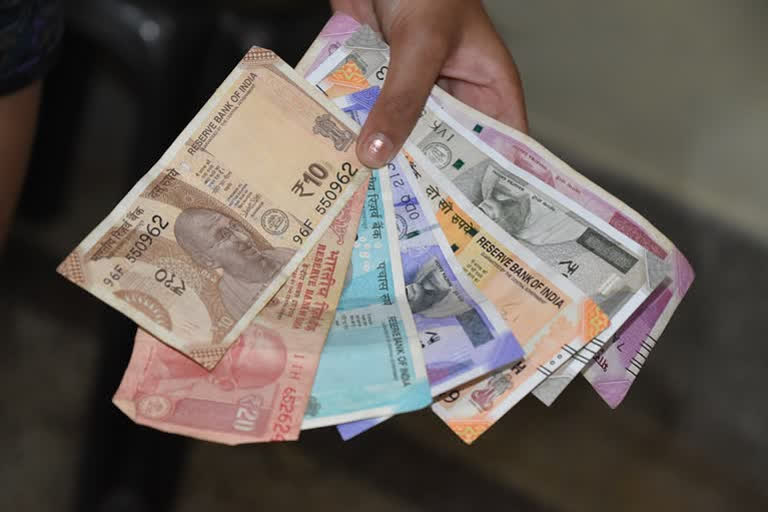New Delhi: After years of making a dignified living, cleaning, cooking and doing a host of other jobs that make them the backbone of many an urban home, part-time domestic helps are reduced to helpless dependence, unable to go to work and waiting out the lockdown in increasing anxiety.
Their employers would love to have them back but the fear of the spread of coronavirus and strict social distancing norms has meant that much of the workforce, comprising mainly women, are stopped from even entering the colony or gated community they work in.
Their future depends on the goodwill of their employers, some who might pay salaries for work not done and some who might refuse. The last month and more has spelt despair for the helps who don't know when the lockdown will end and whether they can get back to work even when it does.
Sushila Kaushalya Devi, who lives in Madanpur Khadar, nearly 12 km from her area of work in south Delhi's C R Park, said one of her three employers preempted the lockdown (announced on March 24) and gave her an advance to stock up on rations.
This would have been okay for the month for her family of four including her husband and two children had it not been for the suddenness of the announcement due to which her brother-in-law's two children, who were visiting at the time, are still with her.
The food which would have lasted the four of us an entire month got over several days ago and there's no money to buy more, she said, adding that she has been unable to collect her salary from the other two employers due to the restrictions on movement.
The money can't be transferred to a bank account because she doesn't have an ATM card and the bank is too far.
Read more: Need to give importance to economy, battle COVID-19: PM to CMs
Married to a vertically challenged man who she said is constantly refused work, Sushila is the sole earning member of the family and struggling to make ends meet with no money coming in for at least another month.
There are about 10-15 lakh women like Sushila in the Delhi-NCR region alone, estimates Maya John of the Gharelu Kamgar Union (GKU) that works with domestic helpers in Gurgaon, Noida, and parts of Rohini in Delhi.
Since there are no official figures documenting the number of people working in this sector, the actual number is likely to be as high as 10-15 lakh, John told PTI.
She said only a few workers were fortunate to receive an advance salary, have access to virtual payment options such as bank transfers, PayTM and Google-Pay, or able to collect their dues from the houses they work in.
Their problems are many, including being harassed by police on the way and lack of public transport. For many, their pre-paid sim cards have run out of money and they have no way of recharging their phones.
Many employers said they were unable to contact their domestic helpers over the phone.
First they face harassment by the police on the way. Even if somehow, through internal lanes and streets, these maids do manage to reach the housing complexes where they work, there is friction with the RWAs. Many are not letting them even collect their salaries, John said.
We have been getting in touch with these RWAs and requesting them to provide confidence building measures' to the workers in these difficult times, by allowing the employers to pay them,she added.
Several employers have also said they would not pay wages if the maids don't turn up for work.
Pinky, who works as a cleaning and cooking help in Noida's Sector 39, has been trying to go and collect her salary from her employers since the first week of April but in vain.
Every time I step out, police stops me at the barricades, she said.
With her husband, a construction worker, also out of work, the couple has been forced to dig into their nominal savings for day-to-day survival.
We were repaying the loan we took for our elder daughter's wedding two years back with whatever money we managed to save. Now we have to depend on that to feed ourselves and the debt is just increasing.
It will be difficult for us to survive another month, the mother of three said, hoping that the lockdown will be lifted on May 3.
Like Sushila, Pinky too does not have access to an ATM card and is waiting for the restrictions to be relaxed so she can collect her salary.
Aditi Yajnik from SEWA, which has been providing relief to the families of domestic workers in different parts of Delhi during the lockdown, said many of the women are migrants and don't have ration cards, or even jan-dhan accounts.
While the Delhi government is trying to provide rations to as many people as possible under its Temporary Ration Coupon Service, Yajnik said the e-coupon process is painfully slow.
To get rations under the scheme, applicants needs to generate an e-coupon through the government's official website using their mobile number and Aadhar Card number.
Most of these people are illiterate, and surfing through a website to download a coupon is not possible for everyone, she pointed out.
Yajnik also noted that while food was most essential to survival, there were other needs like access to medicines, baby food, phone recharges and basic toiletries that must be taken care of.
She cited the example of a five-month pregnant domestic worker who does not have enough money to buy medicines for herself.
She already has three kids and is pregnant with the fourth. The husband worked as a construction labourer, and is out of a job too. There is no money in the family. They had no choice but to wait for food packets to arrive from somewhere, she said.
(PTI Report)



